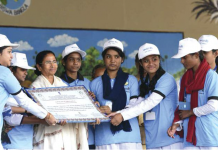 In a candid chat with The Protector, Arindam Sil opens up about his perception of cinema, his competitors and how streaming has changed the concept of viewing cinema. Excerpts:
In a candid chat with The Protector, Arindam Sil opens up about his perception of cinema, his competitors and how streaming has changed the concept of viewing cinema. Excerpts:
Are you bored with acting?
No no, I still want to act. I am acting in Anjan Dutta’s new film. But the problem is that in this industry, everything works on perception. Because I have my own production house, people simply assume I won’t have any time for acting. I am busy with direction now but at one point, I have played the best of characters and I didn’t get my due. Now, people compliment me on my acting. Where were they before 2013? Now, when I direct people, I act out their parts and show it to them and even former Indian skipper Mahendra Singh Dhoni has complimented me on my acting skills.
You’ve played a wide variety of characters. Some portions of a character come from a director’s brief but the majority should happen from man-watching.
I had read Desmond Morris (author of The Naked Ape) when I started acting. It was a deeply disturbing read but it drew me to psychology. I used to read books on psychology when I was in school and what I learnt was the importance of psychology, of body language. A vast number of actors have no input in the role that they play. They do what their director tells them to. Some others are good actors and consistent with their work — Sudipta Chakraborty, Sohini Sarkar or Anirban Bhattacharya. These are people who think about the characters they play and add things of their own. That is my school of acting – an actor has to contribute. In my acting and the characters I have played, my man-watching has helped me tremendously. I have even used lines that I have heard people saying.
You work in an industry that isn’t known for punctuality. But you have a reputation for being punctual. How have you managed this?
I have always believed that you set your own standards. I walked into an industry where I felt like criticizing every bit of it. I was from St. Xavier’s College which taught me to be smart. And then I did my MBA which taught me how to manage men. I went on to work in a corporate organisation. Coming from that background, the way the industry worked shocked me initially. I created the first software for budgeting a production. They never knew what a “fund flow statement” was. I started it. I faced some opposition in the beginning but eventually, everyone fell in line. There was one person who inspired me a lot – Anjan Dutta. He used to tell me: “it isn’t enough to criticise, you must lead by example”. I have tried to do exactly that.
But creativity cannot be constrained to set working hours?
I am a very disciplined creative person. That has come from my extreme fondness for Satyajit Ray. I have never worked with him but I have seen that discipline still surviving in his family. When Sandip Ray makes a film, you can still see that discipline.
In the present industry, who do you think is your competitor?
I think anyone who is doing good work. Whenever I see good work, anything that inspires me, I consider it as competition. We shouldn’t be living in a fool’s paradise. Just because your films are a hit now, you cannot permit your standards to slip.
Streaming video is big now. Are you thinking of something purely for streaming?
With streaming services, the concept of watching movies has changed drastically. Streaming provides a new avenue, for audiences and distributors. A film like Posto was sold for a crore to a local web platform. Before Dhananjoy was even released, the rights had been bought by Amazon Prime. So I was assured that the film was a hit because the money was home. But that didn’t stop me from pushing myself. When I make movies, I will still make them with the theatre in mind but I want to do experimental things for web platforms that haven’t been done before. Bickram Ghosh and I want to do a series on world music. It wouldn’t have been possible to do something like this anywhere else. Streaming is a great thing if you can take it positively, if you don’t go and create something as basic as “Dupur Thakurpo”.
Is the audience different from streaming video?
No, such distinctions are outdated now. Game of Thrones finds huge audiences in smaller centres like Dhanbad and Asansol as well. It isn’t like the old days, where some films would be made for rural audiences and some for the urban crowd. If we can ride this wave, then we can do something in our own language that can find a huge audience. And this popularity can spill over into other areas. Before I made Shabor, Shirshendu Mukhopadhyay’s books weren’t especially popular. But when the film became a hit, the sale of his books shot up. Streaming will allow us to break barriers and do things which weren’t possible before. Streaming won’t destroy cinema, it will strengthen it.
Speaking of Game of Thrones, it is a show which has unprecedented budgets. But in Bengali, we are always told that a smaller audience makes such budgets difficult to justify. Will that ever change?
Do the maths yourself. If Hoichoi manages to get 5 lakh subscribers in the next three years at the rate of Rs 1,000 per subscriber, that’s revenue of Rs 500 crore. Will it then be very difficult for them to create big-budget spectacles? But then, there is no point in creating a meaningless film with huge budgets. Sanjay Leela Bhansali, for example, exploits grandeur. He has great visuals but there is some problem with his story-telling. We have grown up watching films like Ben Hur. Why should we settle for something likePadmavati?
In an industry where everyone avoids commenting on politics, you are very open in your support. Are you never afraid that your comments may have repercussions?
No, because my support is unconditional. I don’t expect any quid-pro-quo from Mamata Banerjee and she is aware of it. My focus is on my cinema. And we all have just one life, should we spend it cowering in fear? The weaker you are the more people take advantage of you. Projecting a certain amount of strength is needed and that strength comes from extreme honesty.
You have a long-standing relationship with the police. Is there any quid-pro-quo there?
Oh yes! And I have to say, the way the Kolkata and West Bengal Police have helped me in my movies, it is unimaginable. You won’t be able to shoot in a bylane in Mumbai without paying off the cops. In Kolkata, we have shot Gunday and Meri Pyari Bindu without any problem. They simply asked us, very humbly, if we wanted to donate something to the police welfare fund and we did it so gratefully. Without their support, it wouldn’t have been possible to stop traffic at Shyambazar 5 Point Crossing for a shoot with Amitabh Bachchan.
There can be no better friend than the Kolkata Police. In Malaysia, I had asked a policeman for directions and he responded rudely. I realised how much more warm and cordial our cops were. In my city, cops help people cross the road; they help the elderly deal with loneliness. I know, because I work closely with Project Pranam. The community policing section of the Kolkata Police is absolutely incredible. I have said this before and I will say it again if they are allowed to work without political interference, Kolkata Police are among the best in the world.
And they have an immense stock of stories
Oh yes! Rahasya Rabibar has become extremely popular on Facebook. Supratim (Additional Commissioner Supratim Sarkar) who has been writing it is a very dear friend of mine. The book is being released at Book Fair this year and I have already asked for the rights to it. Rahasya Rabibar is a web-series I would love to do.
By Deepanjan Ghosh













